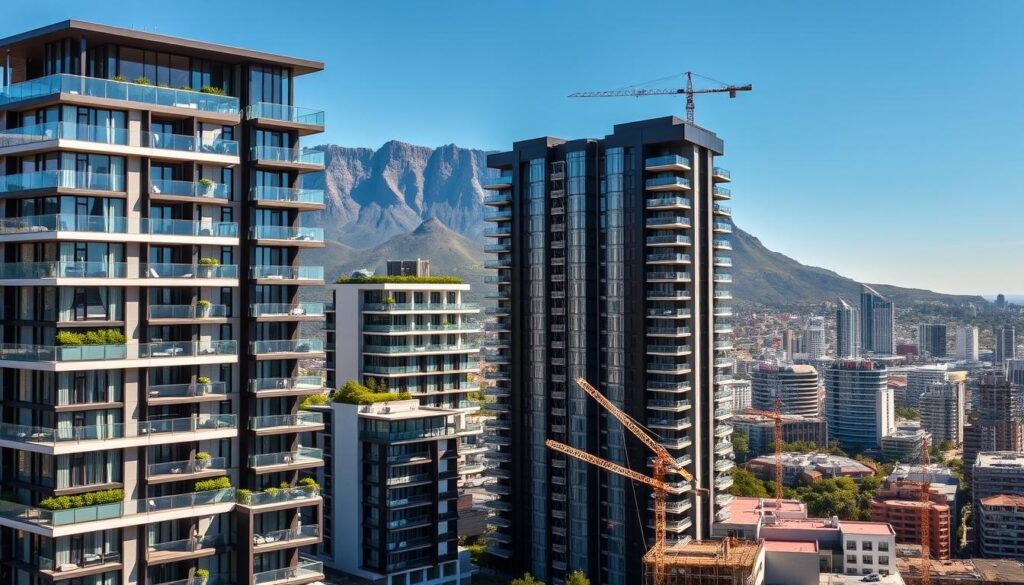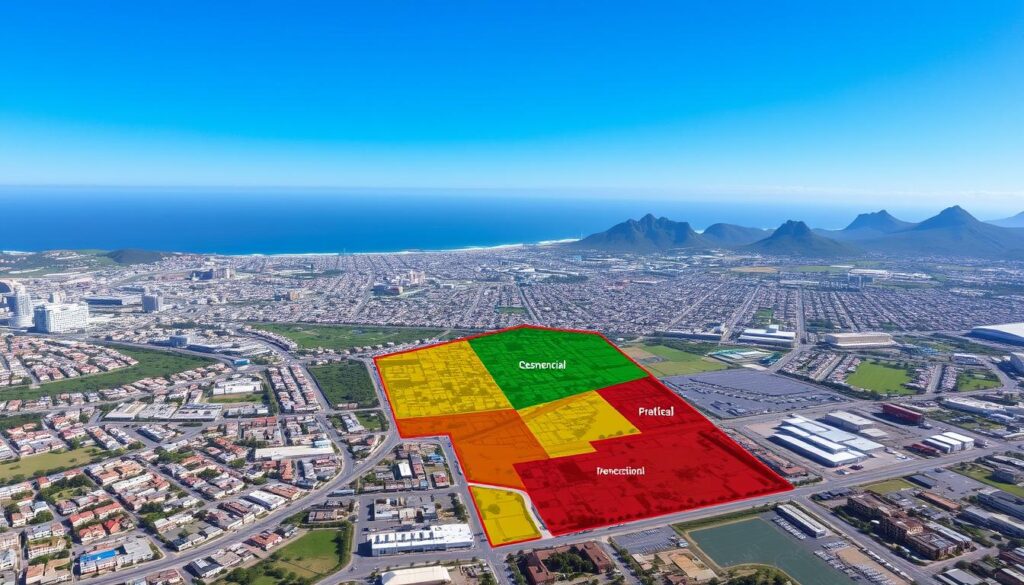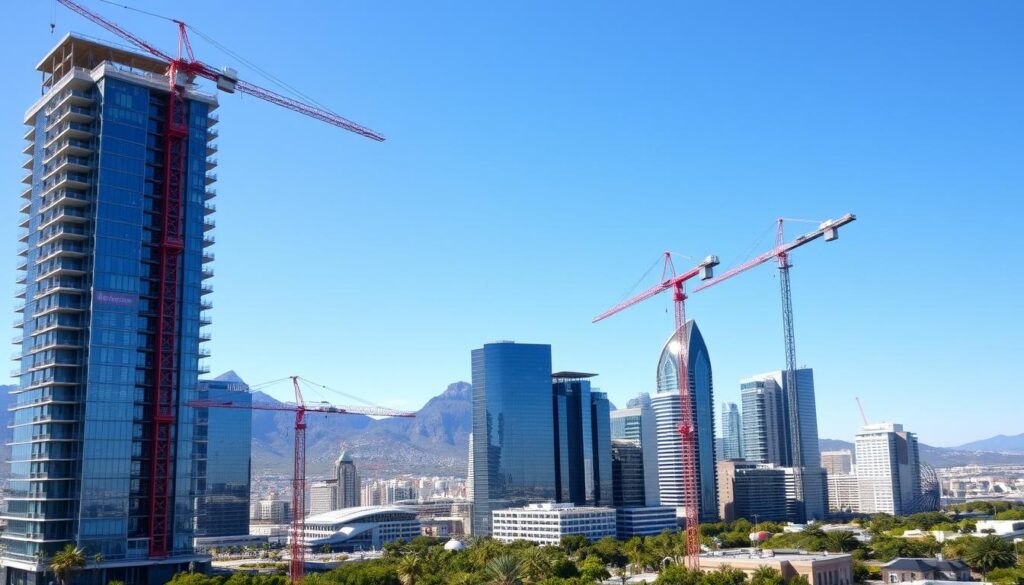In 2025, Cape Town is set to witness a remarkable transformation with a range of property developments that cater to a growing demand for modern and sustainable living spaces. The city is becoming a vibrant hub for new developments in Cape Town, featuring advanced residential communities and dynamic commercial hubs. This boom is driven by the housing market trends shifting towards spacious complexes with onsite amenities, and a significant focus on sustainability1.
With varying options from studios to penthouses, and prices ranging from R695,000 to R10.25 million, there are properties to suit different lifestyles and budgets1. In 2025, the densification and mixed-use developments in Cape Town are expected to enhance urban living, thanks to the growing population and housing demand2. Exciting times lie ahead for homebuyers and investors as Cape Town’s real estate market evolves into a blueprint of contemporary and eco-friendly urban living.
Key Takeaways
- In 2025, Cape Town’s property developments will focus on modern and sustainable living spaces.
- There’s significant interest in new developments in Cape Town due to housing market trends and sustainable initiatives12.
- Property prices in new developments will range from R695,000 to R10.25 million, catering to various budget needs1.
- Cape Town’s real estate market is moving towards densification and mixed-use developments to meet growing demands2.
- Understanding property rights and zoning laws will be crucial for informed buying decisions in 20252.
Introduction to Cape Town’s Property Market in 2025

The real estate market in Cape Town is undergoing significant transformations as we move into 2025. Known for its picturesque landscapes and vibrant culture, Cape Town has always attracted property investors. However, recent years have brought new trends to the fore, especially in sustainable and smart living solutions.
Since the peak in 2022, where property prices surged by 10%, the market has seen a stabilization in 2023, driven by consistent demand for both luxury and eco-friendly properties3. The city’s emphasis on sustainable development is shaping new real estate projects Cape Town, integrating green technologies and biophilic design elements. This not only appeals to environmentally-conscious buyers but also aligns with global sustainability goals.
The anticipated economic stability, with South Africa’s GDP growth projected to hover around 1.8% post-2024 elections, is expected to bolster the property sector3. Moreover, the South African Reserve Bank’s constant repo rate of 8.25% as of 2024 adds another layer of financial predictability for investors3. Coupled with a stabilized inflation rate around 4.5%, real estate ventures seem promising3.
Favorable policy changes are likely to surge housing developments, opening more property investment opportunities3. The GNU’s aim to reduce unemployment below 30% by 2025 further hints at a positive ripple effect on the market3. This surge will create new residential zones catering to diverse demographics, all while retaining the city’s charm.
Investors eyeing Cape Town will also find the recent trends in property returns encouraging. For instance, the total return on listed property during the first ten months of 2024 was an impressive 32%, outperforming the general equity market, cash, and bonds4. Furthermore, as vacancy rates and rentals in the industrial and apartment sectors display positive movement, it signifies robust growth potential4.
In 2025, Cape Town stands as a beacon for sustainable and luxurious living, offering a blend of property investment opportunities that cater to both eco-friendly aspirations and financial prudence. This makes it an ideal locale for new real estate projects, balancing growth, sustainability, and lifestyle appeal.
The Fynbos: A Pioneer in Sustainable Living

The Fynbos is setting a new standard in Property Developments Cape Town by integrating biophilic building design and eco-friendly housing solutions. This innovative project, overseen by The Dogon Group Properties, includes 689 apartments spread across 24 storeys, emphasizing sustainability and human interaction5.
Overview of The Fynbos
Anticipated for completion in the fourth quarter of 2024, The Fynbos aims to attract local and international buyers interested in eco-friendly urban living. Its unique design and sustainable approach reflect an increasing demand for responsible Property Developments Cape Town5. By leveraging green elements such as solar panels, vertical gardens, and rainwater harvesting systems, this development significantly reduces its ecological footprint.
Biophilic Design Features
Biophilic building design is at the heart of The Fynbos, promoting a harmonious connection between residents and nature. The idea of integrating natural elements like vertical gardens and communal green spaces fosters environmental health and resident well-being. This concept not only enhances the living experience but also contributes to overall ecological sustainability5.
Sustainable Technologies and Eco-Friendly Solutions
The Fynbos incorporates state-of-the-art sustainable technologies that make it a flagship for eco-friendly housing. It employs energy-efficient solutions like solar panels to reduce energy consumption and a rainwater harvesting system to promote water conservation. Additionally, the use of vertical gardens helps in improving air quality and reducing urban heat island effects. For more information on this pioneering development, you can read more about it here5.
Key Property Rights and Zoning Laws in 2025

As Cape Town evolves, understanding property rights and zoning laws becomes crucial for investors and developers. These regulations not only shape the landscape but also influence the potential returns on investment and compliance requirements.
Understanding Property Rights
Property rights in Cape Town ensure that landowners have legal claims to use, develop, or lease their properties. These rights, however, are subject to various zoning laws Cape Town mandates, which determine the permissible uses of land. With the proposed introduction of terms like ‘affordable rental flat’ and ‘small-scale energy structure,’ land development companies will have to navigate these definitions to comply with current standards67.
Significance of Zoning Laws
Zoning laws Cape Town enforce enable the city to strategically plan its urban development. They are essential for maintaining orderly growth, ensuring public safety, and preserving community values. For instance, the objection to rezoning in areas like Camps Bay and the City Bowl reflects the tension between commercial interests and residential rights. Nearly half of Camps Bay’s current General Residential (GR2) zoning, with building heights up to 15 meters, might be rezoned to GR4, allowing heights up to 25 meters8.
Upcoming Zoning Changes
Upcoming zoning amendments reflect Cape Town’s commitment to modernizing its urban landscape. The proposed changes to the Municipal Planning By-law (MPBL) include a five-year review process and the establishment of Incentive Overlay Zones (IOZs) in targeted areas like Athlone and Bellville to stimulate growth67. Moreover, emergency housing provisions will allow the city to provide temporary housing on unzoned land for up to 12 months, addressing urgent housing needs without public participation67. These changes aim to balance development with the conservation of heritage areas and the enhancement of urban form, responding to public comments and internal assessments87.
Major Real Estate Projects Shaping 2025

Cape Town’s skyline in 2025 is defined by major real estate projects, including expansive commercial hubs, residential complexes, and mixed-use developments. These projects cater to a growing population and an increasing interest in sustainable and conveniently located living and working spaces, reflecting the modern urban lifestyle.
Commercial Developments
The commercial property development sector in Cape Town is set to boom with new office spaces and retail hubs. Green buildings and energy-efficient solutions are increasingly attractive, supporting the country’s environmental goals9. Major commercial property developments are leveraging advanced technologies and sustainable materials to meet modern business needs. The positive economic outlook for Cape Town in 2025, coupled with improvements in public transportation and road networks, is expected to significantly impact the commercial real estate market9.
Residential Projects
Residential property developments are vital to accommodating Cape Town’s growing population. There is steady housing demand driven by a young population, economic stability, and improved household finances10. Developers are focusing on eco-friendly and energy-efficient homes, which resonate well with buyers interested in sustainable living9. The areas outside the central business district, close to new transportation routes, are particularly appealing for long-term residential investments9. The recovery signs in South Africa’s housing market in 2025 make it a promising year for new residential projects10.
Mixed-Use Developments
Mixed-use developments are becoming increasingly popular in Cape Town. These projects blend commercial and residential property developments, providing a holistic urban living experience. By combining living spaces with office and retail areas, mixed-use developments offer convenience and efficiency. Such projects are especially beneficial in high-growth areas, attracting new residents and young professionals9. These developments are not only space-efficient but also foster community engagement and sustainable urban growth.
Popular Residential Areas for New Homes
In 2025, Cape Town continues to present excellent opportunities in popular residential areas, drawing both local and international property investors. The appeal of Property Developments Cape Town lies in the diverse options covering urban and beachfront locales, suiting a variety of lifestyles. Below, we explore three of the most sought-after neighborhoods: Sea Point, Observatory, and Camps Bay.
Sea Point
Sea Point homes are highly favored for their vibrant lifestyle and breathtaking coastal views. Situated along the Atlantic Seaboard, Sea Point offers a blend of modern apartments and luxurious properties, making it a top choice for investors seeking high returns11. Its proximity to the city center adds to the convenience and attractiveness of the area.
Observatory
Known for its eclectic mix of Victorian houses and contemporary apartments, Observatory is a trendy neighborhood with an artistic flair. The average sale price in this area is around R2 million, making it an affordable yet appealing choice for young professionals and students12. Observatory’s unique charm, coupled with significant infrastructure developments, further elevates its status within Property Developments Cape Town scenes.
Camps Bay
Considered one of the most prestigious areas, Camps Bay luxury properties stand out for their exclusivity and high property values. The average sale price here ranges between R12 to R15 million12. Property prices in South Africa have surged significantly, with Cape Town seeing a 141% increase since 201013. Camps Bay’s scenic beach and luxurious homes attract affluent buyers, enhancing its reputation as a prime property investment area.
Trends in Commercial Property Development

The commercial property sector in Cape Town is experiencing significant growth, with demand for flexible office spaces and retail expansions on the rise. The trend is being driven by modern businesses seeking technologically integrated properties that support hybrid work models.
Demand for Office Spaces
In 2023, the Cape Town City Centre saw an impressive surge in property investments, totaling an estimated R7.285 billion, which is more than double the value seen in 20221415. This upswing included multiple new commercial property developments, attracting businesses due to Cape Town’s appealing hybrid work environments15. Notably, the office vacancy rate improved significantly, dropping to 10.2% by the end of 2023, compared to 13.3% in 2022 and 16.1% in 202114. The office market’s recovery signifies a robust demand for modern, adaptable office spaces, further highlighting the city’s economic rebound.
Retail Expansions
The retail sector in Cape Town has witnessed an expansion, with an increase in mixed-use developments that include substantial retail components15. The number of retail business entities in the Cape Town CBD rose to 1,305 out of 3,302 total entities, indicating a strong presence in the city’s commercial core14. Despite a slight increase in the retail vacancy rate, from 4.9% in 2022 to just under 6.0% in 2023, the need for more retail spaces continues to grow due to the city’s thriving consumer base14.
For more detailed insights, visit the State of Cape Town Central City14.
Impact of Infrastructure Improvements

In 2025, Cape Town is witnessing significant infrastructure improvements, profoundly affecting property developments. These comprehensive upgrades contribute to the growth of the property market, making Cape Town an attractive investment hub.
Public Transport Upgrades
One of the major infrastructure improvements in Cape Town includes public transport upgrades, which are set to provide more efficient and reliable commuting options. The IFC’s ZAR 2.8 billion investment focuses on enhancing the city’s electrical and transport infrastructure, expanding water and sanitation services, and boosting climate and energy resilience16. The improved public transport system aims to support economic growth and inclusivity, particularly in lower-income areas16. This focus on accessibility will likely stimulate property market growth.
Enhancements in Connectivity
Enhancements in connectivity are also a pivotal aspect of Cape Town’s infrastructure developments. The city’s extensive 10-year infrastructure plan addresses population growth and aims to promote inclusivity through better access to essential services16. As part of the National Spatial Development Perspective (NSDP), Cape Town is identified as a major economic center, attracting substantial state investment to support further growth and development17. This plan integrates economic, social, housing, environmental, and infrastructure components to align with the broader City Strategy17. Upgrades in transportation networks, wastewater treatment plants, and proposed projects like the Cape Winelands Airport near Stellenbosch fortify Cape Town’s status as a desirable location for property developments16.
In summary, Cape Town’s infrastructure improvements, particularly in public transport and connectivity, play a crucial role in the ongoing property market growth. These enhancements not only make the city more accessible and livable but also create a conducive environment for sustained economic and social development.
Investment Opportunities in 2025
Cape Town’s real estate market in 2025 offers lucrative property investment opportunities, characterized by high-growth real estate areas and a variety of property types benefiting from government incentives. The following sections detail some of the most promising aspects for investors to consider.
High-Growth Areas
In 2025, Cape Town will continue to present high-growth real estate areas such as Woodstock, Sea Point, and Observatory. These regions are expected to see notable increases in property values due to their ongoing developments and limited housing supply, with property prices potentially increasing by 3% to 7% in 2025 compared to 202418. Additionally, the city’s property market is predicted to expand at an annual rate of 4% over the next five years19, making it ideal for investors seeking stable growth.
Types of Properties to Invest In
Investors have various property investment opportunities in Cape Town, including residential, commercial, and mixed-use properties. Residential properties, particularly tech-equipped and energy-efficient apartments, are projected to have the best value appreciation. Family-sized homes in suburban areas and properties with outdoor spaces are also highly recommended for 202518. Notably, the average property price in Cape Town is around ZAR 3.5 million in 202519, and properties in prime locations typically appreciate at rates of 5% to 7% annually19.
Government Incentives
The South African government provides several incentives to promote property investments. These incentives include tax advantages and subsidies for sustainable and energy-efficient building projects. Additionally, ongoing infrastructure improvements in Cape Town further add value to property investments by enhancing connectivity and reducing commute times18. Investors can capitalize on these opportunities, ensuring long-term returns and stability in high-growth real estate areas.
For a comprehensive guide on the available property investment opportunities and high-growth real estate areas, please visit [https://jb-propertydev.co.za/investment-opportunities-property].
Property Developers Leading the Market
Leading property developers in Cape Town are setting trends with innovative projects and strategic growth plans, shaping the future of the city’s real estate market.
Profiles of Major Developers
MMR Property Developers, a significant player among property developers in South Africa, offers a variety of investment properties in Cape Town, emphasizing responsible and sustainable development. The company’s focus on human-centered design and easy property rentals positions them as a reliable choice for investors and clients alike MMR Property Developers20. Another leading name is Axio Projects, known for its diverse range of developments, from luxury apartments to commercial properties, addressing the market’s varied demands20. Thirdly, Devmco Group boasts over 100 years of combined industry experience with a team of over 60 skilled professionals dedicated to property development, contributing to numerous residential, commercial, and leisure projects21.
Signature Projects
Innovative and sustainable developments are the hallmark of signature property developments in Cape Town. For instance, Axio Projects has spearheaded initiatives like feasibility studies to ensure project viability and effective project management to avoid delays and cost overruns20. Similarly, Devmco Group’s portfolio includes notable commercial offerings such as the Marine Walk Shopping Centre, Innova Haus business hub, and Umhlanga Arch offices, which reflect their commitment to creating safe and innovative spaces21. Additionally, MMR Property Developers highlight Glenwood Estate, known for its modern amenities and convenient access to surrounding areas20.
Future Development Plans
The future is promising for these property developers in South Africa. MMR Property Developers continue to focus on responsible and sustainable projects in Cape Town. Axio Projects aim to collaborate more with private investors and government incentives to support large-scale developments and urban renewal initiatives20. Devmco Group plans to keep transforming visions into reality with their rigorous craftsmanship, precision, and dedication to innovation, promising exciting new developments on the horizon21.
Understanding Market Dynamics: Supply and Demand
The dynamics of Cape Town’s property market in 2025 revolve around the interplay between demand and supply. Various factors contribute to this balance, including economic stability, lifestyle trends, and demographic shifts.
Factors Driving Demand
Several factors are driving the growing demand for housing developments in Cape Town. One significant aspect is the trend of semigration, with people moving from other provinces to Cape Town to capitalize on the city’s appealing lifestyle and infrastructure. This influx has bolstered the real estate market, with properties in high-demand areas moving swiftly22. Additionally, luxury residential properties, especially those in prime locations such as Clifton, Camps Bay, and the Atlantic Seaboard, have experienced higher growth rates in prices23.
The increasing interest from both local and international buyers is also a key driver of demand. The predicted interest rate cut is expected to benefit the Cape Town property market, making it even more attractive to potential buyers22. Furthermore, the city’s population growth continues to influence housing demand and real estate prices in popular neighborhoods23.
Investment in infrastructure improvements, such as public transport upgrades, boosts the appeal of certain areas, subsequently driving demand for properties with excellent connectivity and access to amenities. These factors collectively create a seller’s market condition, where listings are swiftly snapped up by eager buyers22.
Challenges in Supply
On the supply side, the real estate market faces significant challenges. One of the main hurdles is the limited availability of land for new housing developments in Cape Town. The scarcity of land coupled with regulatory constraints impacts the pace at which new properties can be introduced to the market23.
Moreover, the broader economic trends and political climate also play a role in shaping supply dynamics. Cape Town’s property market is sensitive to both local and global economic conditions, which can affect construction costs and developer confidence23. The negotiation leverage that sellers enjoy due to limited stock further complicates the scenario, maintaining higher property values amidst tight supply22.
As such, the market must carefully navigate these supply challenges to meet the growing demand effectively. The interplay between these supply and demand factors determines the overall trajectory of the real estate market.
To get a deeper understanding of Cape Town’s property market trends and statistics, you can explore detailed insights in this overview23.
Conclusion
The overview of Property Developments Cape Town for 2025 brings into focus a city on the cusp of transformation. The interplay between sustainable living projects like The Fynbos, evolving zoning laws, and major commercial and residential developments illustrate a forward-thinking approach to urban growth. Specific areas such as Sea Point, Observatory, and Camps Bay have shown high desirability among homebuyers, further driving property value24.
Additionally, real estate investment opportunities abound with significant interest in mixed-use developments and lifestyle estates. The city’s infrastructure improvements also play a pivotal role in anchoring urban renewal efforts, particularly in vibrant suburbs like Woodstock and Salt River24. Identifying key growth areas and leveraging government incentives can provide substantial returns in this dynamic market.
Finally, the intricate dynamics of supply and demand, influenced by factors such as semigration, limited land availability, and a robust commitment to sustainability, underscore the prospects within this ever-evolving housing market. These insights not only highlight the incredible potential for property investments in Cape Town but also set the stage for a promising future in real estate developments throughout the city2524.
FAQ
What are some of the most notable new developments in Cape Town for 2025?
Cape Town showcases a variety of new property developments in 2025, including high-tech residential communities and innovative commercial hubs. Major real estate projects feature sustainable and conveniently located living and working spaces, with significant demand for luxury and eco-friendly properties.
How is the real estate market in Cape Town characterized in 2025?
The real estate market in Cape Town is marked by a resilient demand for modern, sustainable living spaces. Trends are leaning towards developments that emphasize smart living solutions and sustainable building practices, driven by demographic shifts and evolving buyer preferences.
Can you tell me more about The Fynbos development?
The Fynbos sets a benchmark in sustainable living with innovative biophilic design that integrates natural elements into urban architecture. It includes features like a vertical garden, rainwater harvesting systems, and energy-efficient solutions, aimed at promoting environmental health and resident well-being.
What legal aspects should property investors be aware of in 2025?
Key property rights and zoning laws in Cape Town have adapted to promote denser, mixed-use developments. Investors and developers should stay informed about these legal aspects to ensure compliance and maximize investment potential. Upcoming zoning changes may also impact property purchases and construction.
Which areas in Cape Town are popular for housing developments?
In 2025, Sea Point, Observatory, and Camps Bay are among the most sought-after residential areas. These neighborhoods offer a variety of housing options, from modern apartments to luxurious beachfront homes, coupled with scenic views, vibrant community life, and excellent investment potential.
What trends are influencing commercial property development in Cape Town?
There is a notable growth in the demand for flexible office spaces and retail expansions in Cape Town. Modern businesses are increasingly seeking properties that offer technological integration and adaptability to hybrid work models, shaping the design and functionality of commercial real estate.
How have infrastructure improvements impacted property developments?
Infrastructure improvements, including enhancements in public transport and connectivity, have significantly impacted property developments. These upgrades have made various areas more accessible and desirable, facilitating smoother commutes and contributing to the overall appeal of living and investing in Cape Town.
What are some of the investment opportunities in Cape Town’s real estate market?
Cape Town’s real estate market presents diverse investment opportunities in high-growth areas and a variety of property types. Government incentives further boost these prospects. Investors can focus on properties that offer long-term value appreciation and areas with significant developmental potential.
Who are some leading property developers in Cape Town?
Leading property developers in Cape Town are setting trends with innovative projects and strategic growth plans. These developers are at the forefront of shaping the city’s real estate market, highlighting the evolution of property development through their signature projects and future plans.
What factors are driving demand in Cape Town’s property market?
Demand in Cape Town’s property market is driven by factors such as economic stability, lifestyle trends, and demographic shifts. These elements contribute to the overall dynamics of the market, influencing buyer preferences and investment decisions.
What challenges does the supply side of the property market face?
The supply side of Cape Town’s property market faces challenges including limited land availability and regulatory constraints. These factors affect the market’s trajectory and present obstacles that developers and investors must navigate to meet the growing demand.
Source Links
- https://www.ooba.co.za/resources/new-developments-cape-town/
- https://www.celsaproperties.com/news/understanding-property-rights-zoning-and-development-plans-in-2025/
- https://www.linkedin.com/pulse/understanding-property-market-cycles-navigating-ups-downs-mangco-zssvf
- https://propertywheel.co.za/2024/11/the-state-of-sas-property-market-q3-2024/
- https://www.theworlds50best.com/stories/News/fyn-cape-town-sustainable-restaurant-award.html
- https://solarquarter.com/2024/07/24/city-of-cape-town-proposes-amendments-to-municipal-planning-by-law-to-boost-development-and-renewable-energy/
- https://propertywheel.co.za/2024/07/cape-town-proposes-amendments-and-new-provisions-to-its-municipal-planning-by-law/
- https://www.atlanticsun.co.za/news/civics-tackle-city-on-planning-by-law-6d1d9d73-fe5b-49a9-b6ed-acaa167ebd8e
- https://www.celsaproperties.com/news/looking-ahead-property-investment-strategies-for-2025/
- https://hellolifestyle.co.za/top-property-trends-for-2025/
- https://www.denis-dunn-investor-club.co.za/blog/best-areas-to-buy-property-in-cape-town-south-africa-2024
- https://www.ooba.co.za/resources/best-suburbs-cape-town/
- https://igrow.co.za/5-popular-investment-areas-in-cape-town-and-the-prime-suburbs-of-sa/
- https://www.capetownccid.org/news/cape-towns-investment-potential-soars
- https://propertywheel.co.za/2024/08/a-surge-of-property-investment-in-cape-towns-cbd-during-2023-doubles-2022s-value/
- https://www.linkedin.com/pulse/cape-town-prime-real-estate-investment-hub-unmatched-de-stefanis-jku2f
- https://resource.capetown.gov.za/documentcentre/Documents/City strategies, plans and frameworks/Annexure B – FutureCapeTown.pdf
- https://theafricanvestor.com/blogs/news/cape-town-price-forecasts
- https://theafricanvestor.com/blogs/news/cape-town-market-data-real-estate
- https://axioprojects.com/property-development/
- https://devmcogroup.co.za/
- https://atlanticseaboard.seeff.com/news/why-its-still-a-good-time-to-sell-in-the-current-cape-town-property-market/
- https://theafricanvestor.com/blogs/news/cape-town-real-estate-market
- https://www.linkedin.com/pulse/cape-town-real-estate-market-look-emerging-trends-charl-du-plessis
- https://www.propertycoza.com/cape-towns-property-landscape-challenges-opportunities-and-strategies-for-landlords-and-developers/

